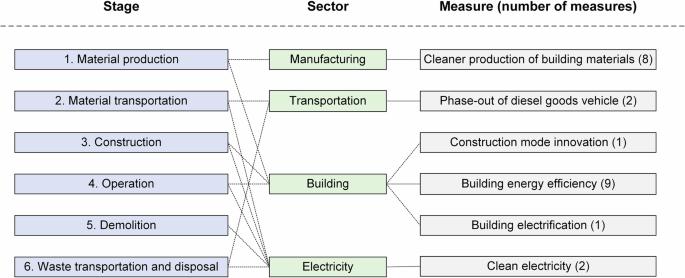Multi-sectoral efforts are required for decarbonising the building sector: a case in Hong Kong
IF 8.8
Q1 ENVIRONMENTAL STUDIES
引用次数: 0
Abstract
Decarbonising the building sector involves collaborative efforts from multiple sectors. Previous studies only focused on carbon mitigation within individual measures, impeding the interconnections within various stages, contributing sectors, and measures. We propose an innovative “stage-sector-measure” framework for evaluating the carbon mitigation effects of the building sector and apply it to Hong Kong. Results show carbon emissions of Hong Kong’s building sector will decrease by 84.4% in 2050. Electricity is the most significant contributing sector, accounting for 71.8% of accumulative mitigation effects of Hong Kong’s building sector. Regarding measures, cleaner production of concrete and steel represents 62.9% of mitigation effects in material production stage, while alternative fuel mix and carbon capture and storage account for 42.2–87.7% of those in other stages. By clarifying the relationships among the stages, contributing sectors, and measures, we identify the mitigation mechanism of the building sector and reveal the significance of multi-sectoral efforts in its decarbonisation.

建筑行业去碳化需要多部门的努力:香港的一个案例
建筑行业的去碳化涉及多个部门的共同努力。以往的研究只关注个别措施的碳减排效果,而忽略了不同阶段、贡献部门和措施之间的相互联系。我们提出了一个创新的 "阶段-部门-措施 "框架来评估建筑行业的碳减排效果,并将其应用于香港。结果显示,到 2050 年,香港建筑行业的碳排放量将减少 84.4%。电力是贡献最大的行业,占香港建筑行业累积减排效果的 71.8%。在措施方面,混凝土和钢材的清洁生产占材料生产阶段减排效应的 62.9%,而替代燃料组合和碳捕集与封存占其他阶段减排效应的 42.2-87.7%。通过厘清各阶段、贡献部门和措施之间的关系,我们确定了建筑行业的减排机制,并揭示了多部门努力在其脱碳过程中的重要意义。
本文章由计算机程序翻译,如有差异,请以英文原文为准。
求助全文
约1分钟内获得全文
求助全文

 求助内容:
求助内容: 应助结果提醒方式:
应助结果提醒方式:


